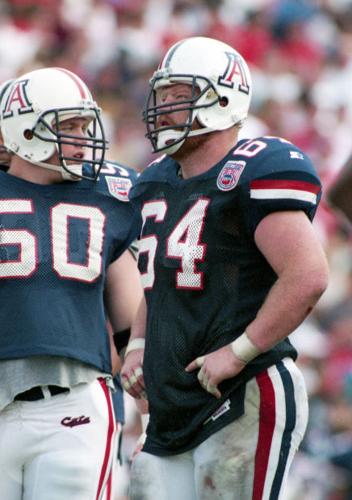Many of Warner Smith’s ol’ Desert Swarm teammates are doing the Ice Bucket Challenge, but it’s not about being macho or getting some Facebook time.
Most of the ex-Wildcats end their challenge with the same message: “Get well, Warner.”
The Ice Bucket Challenge is about fighting a horrific disease, amyotrophic lateral sclerosis. Warner Smith has ALS.
You would never know it to look at Smith or to hear his perpetually cheery voice. He looks much the same as he did as a first-team All-Pac-10 guard in 1994, pictured in Sports Illustrated kneeling in front of the open-pit mine in his hometown, San Manuel.
Smith is an outdoorsman of note, recently home from a hunting trip to South Africa, and before that fishing’s Bassmaster Classic and before that some hog hunting in Texas and on and on.
He has been one of Tucson’s leading high school football and basketball referees for the last seven years and is a part of the chain-gang crew when his old team, the Arizona Wildcats, are at home.
“I’m pretty much full-go,” he says. He works for Garmin, a GPS engineering and software firm, is married and, he laughs, “I’ve got a 4-year-old redheaded fireball at home. Charlee keeps me smilin’. ”
ALS, also known as Lou Gehrig’s disease, isn’t a smilin’-type disease. It attacks your neuromuscular system and cripples you. There is no known cure. At 41, Warner Smith knows what he is getting into. He has chosen to dig in and take his cuts.
Nagged by cramps in his lower left leg, Smith visited an orthopedic specialist last spring, believing the discomfort was related to some old football injuries. The doctor told him it wasn’t related to football at all. Smith looked at the doctor’s face.
“I knew it wasn’t good,” he remembers. By May, he was diagnosed with ALS, one of 5,600 Americans so diagnosed each year.
“It took a few days to get off the mat; I was feeling miserable about it,” he says. “But I came to the realization that time is precious and I can’t waste any of it. I know all about Lou Gehrig. It’s better for me to get this in the open and deal with it. I’m good.”
Smith checks the ALS website most days and is encouraged by the numbers: a week ago, the Ice Bucket Challenge raised $10 million for ALS research. By Wednesday it was at $30 million and rising.
A year ago, ALS raised $1.9 million, total. Now it seems to make that much every 24 hours.
On the surface, the Ice Bucket Challenge is fun. TV anchors get doused with freezing water and turn it into promotional footage. Football coaches do it to help in team-bonding. Michael Jordan did it this week. So did the U.S. Ryder Cup golf team.
But ideally, the challenge isn’t for famous people (or some guy down the street) to get wet as much as it is to donate to ALS research. Smith’s doctors told him that the beat-ALS medicine he uses to diminish leg cramps and allow him a good night’s sleep has been developed in the last few years.
If that’s not encouraging, what is?
And then there was this development: While desperate to get full and effective treatment, Smith encountered difficulty gaining access to leading ALS experts. His former Desert Swarm teammates, especially Joe Smigiel, Charlie Camp and Eric Johnson, got involved. They called former UA coach Dick Tomey.
Could he help?
“Early the next morning, I saw the Hawaii area code on my cellphone and knew it was Coach Tomey,” Smith says. “I told him I was frustrated. He said, ‘I’ll take care of it.’”
Tomey called UA coach Rich Rodriguez and together they connected the dots. In a few days, Smith had an appointment with Dr. Katalin Scherer, the Arizona Medical Center’s associate professor of neurology, and a ranking expert in ALS research.
Each of Smith’s appointments is a four-hour process. The fight has begun.
“As I look back now, when I was a 17-year-old kid from San Manuel, I realized that I made the right choice to attend Arizona,” he says. “My support system at the UA kicked in 20 years after I played my last game there.”
ALS specialists have told Smith that the disease is thus far slow moving. Beyond that, it’s anybody’s guess. Some with ALS live a bare two or three years. Others can live 10 and even 20 years.
Smith says he has begun to knock off some “bucket list” items, one of which was hunting wildebeest and oryx in South Africa. He won the Arizona (hunting) lottery, successfully drawing a permit to hunt bull elk for the first time next month.
And as the days go by, watching the Ice Bucket Challenge donations to ALS grow and grow, Smith doesn’t dwell on the grim prognosis.
“There aren’t many people in America who aren’t aware of the fight against ALS any longer,” he says. “A lot of people are freezing to give me a warm feeling.”





